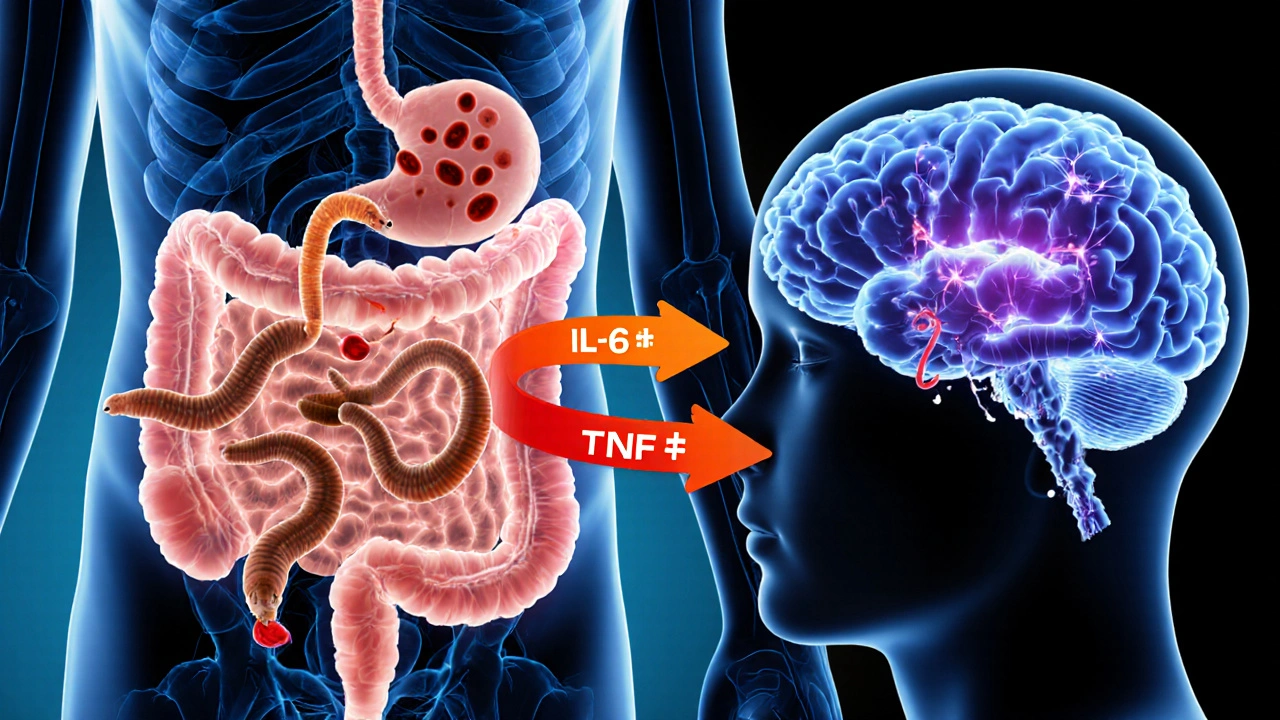How Worm Infections Harm Children's Cognitive Development

Oct, 8 2025
Worm Infection Impact Calculator
Assess Your Child's Risk
Enter information below to estimate potential cognitive impacts and learn prevention steps.
Estimated Impact Report
When a child’s schoolwork suddenly slips or attention wanes, many parents first blame “just a phase.” In reality, an unseen culprit could be a worm infection. Below you’ll see why these parasites matter far beyond a stomach ache, how they can slow the brain’s growth, and what parents can do right now.
Quick Takeaways
- Soil‑transmitted helminths (STH) affect up to 1.5billion people, with children bearing the heaviest burden.
- Chronic infections lead to anemia, malnutrition, and inflammation-key drivers of lower IQ scores and poorer school performance.
- Regular deworming (once or twice a year) can boost test scores by 5‑15% in high‑risk areas.
- Simple hygiene steps-hand‑washing, proper footwear, and safe food handling-cut transmission by half.
- Early screening and treatment are most effective before age8, when the brain’s plasticity is highest.
What Are Worm Infections?
Soil‑transmitted helminths are a group of intestinal parasites that live in contaminated soil and are passed to humans through fecal‑oral routes or skin penetration. The three big players are:
- Ascaris lumbricoides the giant roundworm, capable of growing up to 30cm
- Trichuris trichiura the whipworm, whose thin tail can embed in the colon lining
- Hookworm (Necator americanus) a small parasite that penetrates the skin, often through bare feet
These worms thrive in warm, humid climates and in areas with poor sanitation-think rural schools, crowded urban neighborhoods, and refugee camps.

How Worms Mess With the Growing Brain
The link between infection and cognition isn’t magic; it’s a cascade of physiological stressors.
- Nutrient steal: Worms consume up to 20% of a child’s dietary protein and iron, leaving less for brain tissue. Even a modest drop in iron can impair myelin formation, the protective sheath around nerve fibers.
- Chronic anemia: Hookworm, in particular, feeds on blood. Persistent low hemoglobin reduces oxygen delivery to the brain, slowing processing speed and memory consolidation.
- Inflammatory cytokines: The body’s immune response releases substances like IL‑6 and TNF‑α, which cross the blood‑brain barrier and interfere with neurogenesis, the birth of new neurons essential for learning.
- Appetite suppression: Heavy worm loads can cause abdominal pain and nausea, leading children to eat less. Undernutrition further limits the supply of essential fatty acids needed for synaptic plasticity.
Combined, these factors can shave months off a child’s developmental timeline. A study in Kenya found that infected children scored an average of 7 points lower on standardized reading tests compared to dewormed peers.
What the Data Really Says
Multiple randomized controlled trials (RCTs) have quantified the cognitive toll.
| Location | Sample Size | Intervention | IQ/Score Change |
|---|---|---|---|
| Bangladesh (2009) | 1,200 | Biannual albendazole | +4.3 points on WPPSI |
| Benin (2013) | 850 | Single-dose mebendazole | +5.1% improvement in math scores |
| Philippines (2017) | 2,500 | Quarterly deworming + nutrition | +6.7% rise in reading fluency |
Notice the pattern: when drug treatment is paired with nutritional support, gains climb higher. That’s because removing the parasite clears the path for nutrients to reach the brain.
Spotting and Treating Infections
Diagnosis usually involves a stool sample examined under a microscope. Rapid antigen tests are emerging but are still limited to research settings.
World Health Organization (WHO) guidelines recommend a single dose of albendazole 400mg tablets, effective against most STH species or mebendazole for school‑age children in endemic regions. The treatment is safe, cheap, and can be administered by teachers.
Side effects are rare-some kids feel mild stomach discomfort for a day, but the benefits far outweigh the inconvenience.

Prevention: Stopping Worms Before They Enter
Mass deworming is a short‑term fix; breaking the transmission cycle offers lasting protection.
- Hand‑washing with soap after toilet use cuts fecal‑oral spread by up to 42%.
- Footwear: Wearing shoes in fields and playgrounds prevents hookworm larvae from burrowing through skin.
- Sanitation: Building latrines and ensuring they’re used reduces soil contamination dramatically.
- Safe food: Washing fruits and vegetables thoroughly, especially those eaten raw, removes attached eggs.
Community‑level programs that combine education, infrastructure, and regular deworming have shown a 60% drop in infection prevalence after three years.
Practical Tips for Parents
- Schedule a stool test if your child lives in a high‑risk area or shows chronic fatigue, abdominal pain, or unexplained weight loss.
- Enroll them in school deworming campaigns; most programs are free and coordinated with local health departments.
- Offer iron‑rich foods-spinach, lentils, red meat-to combat anemia. Pair with vitaminC for better absorption.
- Make hand‑washing a game: sing a 20‑second song while scrubbing.
- Keep shoes near the door and encourage wearing them outdoors, even in the backyard.
Taking these steps not only shields your child’s gut but also gives their brain the fuel it needs to learn, play, and grow.
Frequently Asked Questions
Can a single worm infection really affect IQ?
Yes. Even a low‑intensity infection can cause enough iron loss and inflammation to shave points off standardized test scores. The effect grows with the number of worms and the duration of infection.
How often should children be dewormed?
WHO advises once a year in low‑prevalence regions and twice a year where infection rates exceed 20%. Local health authorities may adjust the schedule based on recent surveys.
Are deworming medicines safe for young kids?
Both albendazole and mebendazole have been used in millions of children worldwide with a solid safety record. Side effects are mild and temporary, usually limited to stomach upset.
What’s the difference between Ascaris, Trichuris, and Hookworm?
Ascaris lives in the small intestine and can grow very large; Trichuris embeds its thin tail in the colon; Hookworm penetrates the skin and feeds on blood, causing the most anemia.
Can good nutrition alone offset the damage?
Nutrition helps, but it won’t remove the parasite’s direct drain on resources. The best outcomes come from combining deworming with a balanced diet.
